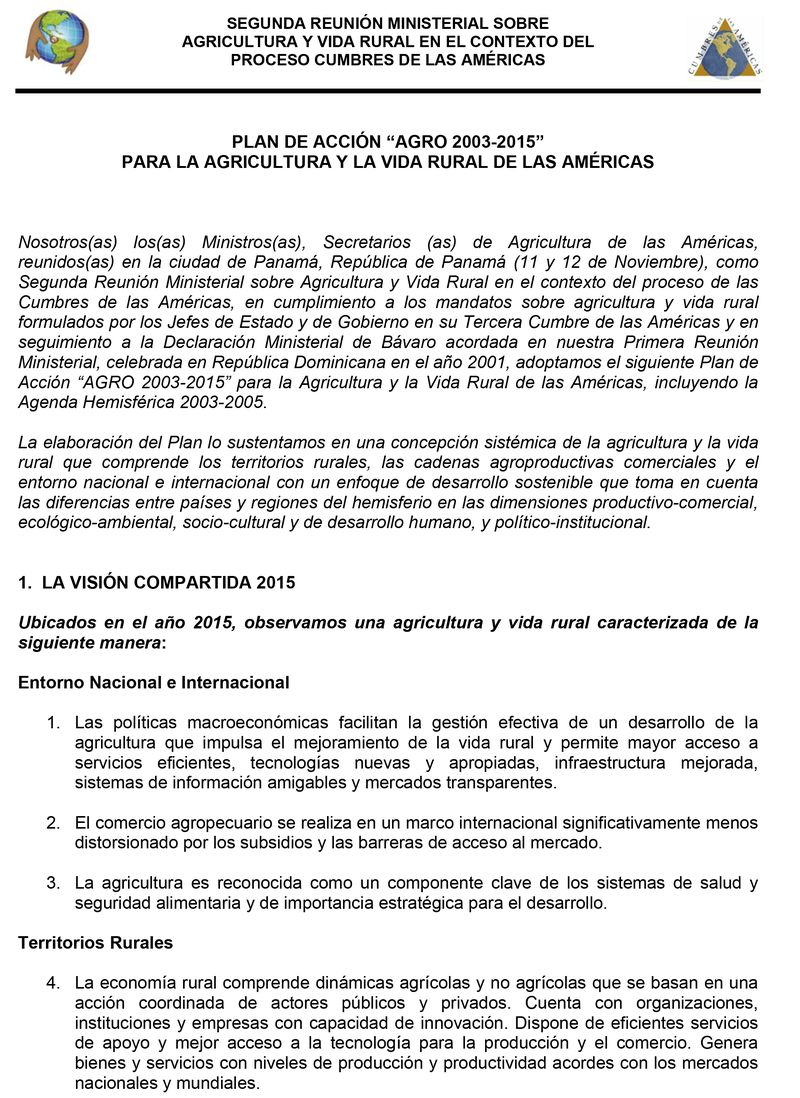World Agriculture: Towards 2015/2030. An FAO perspective
World agriculture: towards 2015/2030 is FAO’s latest assessment of the long-term outlook for the world’s food supplies, nutrition and agriculture. It presents the projections and the main messages. The projections cover supply and demand for the major agricultural commodities and sectors, including fisheries and forestry. This analysis forms the basis for a more detailed examination of other factors, such as nutrition and undernourishment, and the implications for international trade.
Plan de acción “AGRO 2003-2015”
En el marco de la Segunda Reunión Ministerial sobre Agricultura y Vida Rural en el contexto del proceso Cumbres de las Américas, los(as) Ministros(as), Secretarios (as) de Agricultura de las Américas, reunidos(as) en la ciudad de Panamá acordaron adoptar el PLAN DE ACCIÓN “AGRO 2003-2015” PARA LA AGRICULTURA Y LA VIDA RURAL DE LAS AMÉRICAS.
Gender Strategy in Agriculture and Rural Development to the Year 2010
The renovation process in Vietnam in the past decade has enabled significant economic growth as well as and greater rights and more important economic roles of farming households. However, much of this reform has focussed on men as head of households, meaning men have benefited more from economic reform, both economically and in terms of their power within the household. Inequalities continue in access to and control of key resources such as land, water, credit and rest time, as well as in access to public services.
’Land for Peace’ – A Submission to the South African Portfolio Committee on Agriculture and Land Affairs
Argues the need for landowners in South Africa to draw lessons from events in Zimbabwe and to be much more radical, proactive and imaginative in promoting needed changes in land reform, failing which they will have no future, as pressures from the landless intensify. The current status quo is unsustainable and the national effort inadequate. The private sector has a key role to play to break the current logjam. Increasing number of landowners are beginning to see the light and accept political realities. Calls for a land summit to negotiate a comprehensive agrarian transformation.
Transformaciones en las formas de producción de la agricultura bonaerense, 1937-1969
Fil: Balsa, Juan Javier. Universidad Nacional de La Plata. Facultad de Humanidades y Ciencias de la Educación; Argentina.
Land reform in Zimbabwe – good for poor black farmers?
Zimbabwe’s fast-track land reform has had a bad press. Reports of violence and intimidation have obscured the reality that formal procedures used to settle black farmers in model villages bear a striking resemblance to earlier colonial procedures. Whilst colonial myths about African farmers as subsistence oriented and inefficient live on, evidence from south-eastern Zimbabwe suggests that the reforms have benefited some poor black farmers
Child farm labor: the wealth paradox
This paper is motivated by the observation that children in land-rich households are often more likely to be in work than the children of land-poor households.The vast majority of working children in developing countries are in agricultural work, predominantly on farms operated by their families. Land is the most important store of wealth in agrarian societies and it is typically distributed very unequally. These facts challenge the common presumption that child labour emerges from the poorest households.
Land liberalisation in Africa: inflicting collateral damage on women?
Is the World Bank’s approach to land relations gender insensitive? Is it realistic to pin poverty reduction aspirations on the promotion of credit markets and reliance on women’s unpaid labour? Does the acquisition of secure tenure rights necessarily benefit poor women? How should advocates of women’s rights in Africa respond to the Bank’s land agenda?
Poverty, institutions, peasant band conservation investment in Northern Ethiopia
This PhD thesis provides an econometric analysis of various aspects of the rural economy in Northern Ethiopia.The thesis consists of five papers:an in-depth analysis of poverty, its distribution, dynamics and its correlates within the framework of the role of economic reforms on poverty reduction in a remote, unstable and environmentally troubled regionlooks at the issue of the efficacy of a micro-finance program in reaching out to the poor and measures the impact of program participationexamines the efficacy of food-for-work (FFW) programs in targeting the poor by emphasizing the role of F
Tenure security and land-related investment: evidence from Ethiopia
Report finds that land rights in Ethiopia are highly insecure, and higher tenure security and transferability could enhance investment and agricultural productivity. Trying to identify and implement measures to increase producers’ tenure security could have a large pay-off in terms of rural productivity and poverty reduction.The authors use a large data set from Ethiopia that differentiates tenure security and transferability to explore determinants of different types of land-related investment and its possible impact on productivity.
Política de Equidad de Género en el Sector de la Gestión Ambiental y su Plan de Acción 2003-2008.
El presente documento establece la Política de Equidad de Género en el Sector de la Gestión Ambiental y su Plan de Acción, que tienen alcance nacional y se refieren al período 2003-2008. La política tiene por objetivo principal propiciar dentro del Ministerio de Ambiente y Recursos Naturales (MARN) la equidad de género en todas las políticas, programas, proyectos y planes de acción que se emitan. Entre los objetivos específicos, cabe destacar el de impulsar una eficaz política ambiental que propicie y fomente oportunidades, con base en los derechos humanos.






